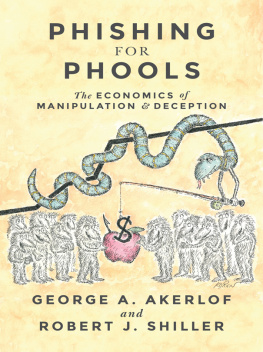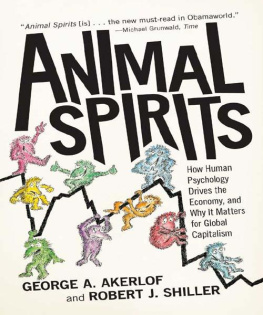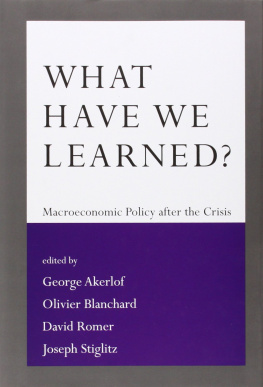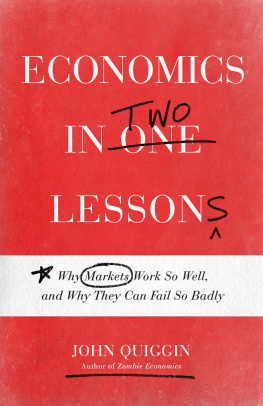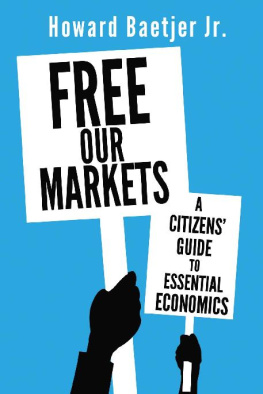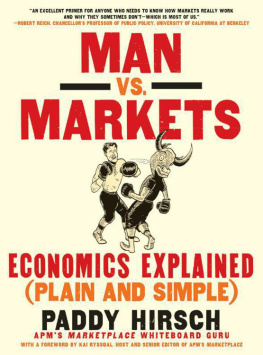
Phishing for Phools
Phishing for Phools
THE ECONOMICS OF MANIPULATION AND DECEPTION
GEORGE A. AKERLOF
AND
ROBERT J. SHILLER
Princeton University Press PRINCETON AND OXFORD
Copyright 2015 by Princeton University Press
Published by Princeton University Press, 41 William Street, Princeton, New Jersey 08540
In the United Kingdom:
Princeton University Press, 6 Oxford Street, Woodstock, Oxfordshire OX20 1TW
press.princeton.edu
Jacket illustration Edward Koren. Jacket design by Jason Alejandro.
(How Much Is That) Doggie in the Window? Written by Bob Merrill. Copyright 1953, 1981 Golden Bell Songs. Used by permission.
All Rights Reserved
ISBN 978-0-691-16831-9
British Library Cataloging-in-Publication Data is available
This book has been composed in Adobe Galliard and Formata by Princeton Editorial Associates Inc., Scottsdale, Arizona
Printed on acid-free paper.
Printed in the United States of America
10 9 8 7 6 5 4 3 2 1
CONTENTS
PREFACE
I ts the economy, stupid! said James Carville, campaign advisor to presidential candidate Bill Clinton in 1992. He wanted to stick it to President George H. W. Bush for an array of economic problems that were tied to the economic recession that started during the Bush presidency. Well, we have a different, broader interpretation of Carvilles statement: that many of our problems come from the nature of the economic system itself. If business people behave in the purely selfish and self-serving way that economic theory assumes, our free-market system tends to spawn manipulation and deception. The problem is not that there are a lot of evil people. Most people play by the rules and are just trying to make a good living. But, inevitably, the competitive pressures for businessmen to practice deception and manipulation in free markets lead us to buy, and to pay too much for, products that we do not need; to work at jobs that give us little sense of purpose; and to wonder why our lives have gone amiss.
We wrote this book as admirers of the free-market system, but hoping to help people better find their way in it. The economic system is filled with trickery, and everyone needs to know that. We all have to navigate this system in order to maintain our dignity and integrity, and we all have to find inspiration to go on despite craziness all around us. We wrote this book for consumers, who need to be vigilant against a multitude of tricks played on them. We wrote it for businesspeople, who feel depressed at the cynicism of some of their colleagues and trapped into following suit out of economic necessity. We wrote it for government officials, who undertake the usually thankless task of regulating business. We wrote it for the volunteers, the philanthropists, the opinion leaders, who work on the side of integrity. And we wrote it for young people, looking ahead to a lifetime of work and wondering how they can find personal meaning in it. All these people will benefit from a study of phishing equilibriumof economic forces that build manipulation and deception into the system unless we take courageous steps to fight it. We also need stories of heroes, people who out of personal integrity (rather than for economic gain) have managed to keep deception in our economy down to livable levels. We will tell plenty of stories of these heroes.
Products of Free Markets
The late nineteenth century was a busy time for inventors: the automobile, the telephone, the bicycle, the electric light. But another invention of the time has received much less attention: the slot machine. Slot machine in the beginning did not have its present-day connotation. The term referred to any sort of vending machine: you deposited your coin in a slot; you got to open a box. By the 1890s slot machines were selling chewing gum, cigars and cigarettes, opera glasses, chocolate rolls in individual paper wrappers, even quick looks at the precursor-to-the-phone-book city directoriesall manner of things. The basic innovation was a lock activated by the deposit of a coin.
But then a new use was discovered. It wasnt long before slot machines began to include gambling machines. A newspaper of the time dates the appearance of slot machines in this modern sense to 1893. One of those early machines rewarded winners with fruit candy rather than money; it was not long before everybody ascribed special meaning to that rare coincidence: the appearance of three cherries.
Before the 1890s were over, a new kind of addiction, to gambling slot machines, had been born. In 1899 the Los Angeles Times reported, In almost every saloon may be found from one to half a dozen of these machines, which are surrounded by a crowd of players from morning to night. Once the habit is acquired it becomes almost a mania. Young men may be seen working these machines for hours at a time. They are sure to be the losers in the end.
Then the regulators stepped in. Slot machines were ruining so many peoples lives they had to be outlawed, or at least regulated, along with gambling more generally. They disappeared from public life, relegated almost entirely to the fringe: to special places designated as casinos, and to loosely regulated Nevada, where slot machines are widely to be found in supermarkets, gas stations, and airports; the average adult spends 4 percent of income on gambling, nine times the US national
With computerization, the slot machine has entered a new career. Following the title of the 2012 book by MITs Natasha Schll, the new machines are addictive by design.
What Markets Do for Us
The history of the slot-machine-good/slot-machine-bad from the 1890s to the present illustrates our dual view of our market economy. Most fundamentally, we applaud markets. Free markets are products of peace and freedom, flourishing in stable times when people do not live in fear. But the same profit motive that produced those boxes that opened and gave us something we wanted has also produced slot machines with an addictive turn of the wheel that takes your money for the privilege. Almost all of this book will be figuratively about slot-machines-bad, rather than about slot-machines-good: because as reformers both of economic thought and of the economy we seek to change not what is right with the world, but rather what is wrong. But before we begin, we should reflect on what markets do for us.
To do so, it is useful to take a long perspective and return to that era of the late nineteenth/early twentieth century. In December 1900, in The Ladies Home Journal civil engineer John Elfreth Watkins Jr. participated in the sport of predicting what life would be like one hundred years hence. He predicted we would have hot and cold air [coming] from spigots. We would have fast ships that would get us to England in two days. There will be airships, mainly used by the military, but sometimes for passengers and freight. Grand opera will be telephoned to private homes and will sound as harmonious as though enjoyed from a theatre box. The predictions go on.
Watkins described his predictions as seeming strange, almost impossible; but, remarkably, free markets, with their incentives to produce what people want, as long as a profit can be made, have made his predictions come true, and more.
However, free markets do not just deliver this cornucopia that people want. They also create an economic equilibrium that is highly suitable for economic enterprises that manipulate or distort our judgment, using business practices that are analogous to biological cancers that make their home in the normal equilibrium of the human body. The slot machine is a blunt example. It is no coincidence that before they were regulated and outlawed slot machines were so common that they were unavoidable. Insofar as we have any weakness in knowing what we really want, and also insofar as such a weakness can be profitably generated and primed, markets will seize the opportunity to take us in on those weaknesses. They will zoom in and take advantage of us. They will phish us for phools.
Next page
